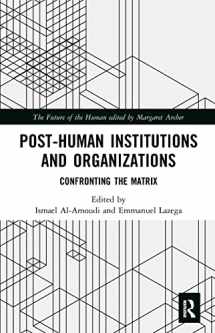
Post-Human Institutions and Organizations (The Future of the Human)
Book details
Summary
Description
When the Matrix trilogy was published in the mid-1980s, it introduced to mass culture a number of post-human tropes about the conscious machines that have haunted our collective imaginaries ever since. This volume explores the social representations and significance of technological developments – especially AI and human enhancement – that have started to transform our human agency. It uses these developments to revisit theories of the human mind and its essential characteristics: a first-person perspective, concerns and reflexivity. It looks at how the smart machines are used as agents of change in the basic institutions and organisations that hold contemporary societies together, for example in the family and the household, in commercial corporations, in health institutions or in the military. Its main purpose is to enrich the ongoing public discussion of the social and political implications of the smart machines by looking at the extent to which they further digitalise and bureaucratise the world, in particular by asking whether they are used to develop techno-totalitarian societies that corrode normativity and solidarity.


We would LOVE it if you could help us and other readers by reviewing the book
Book review



